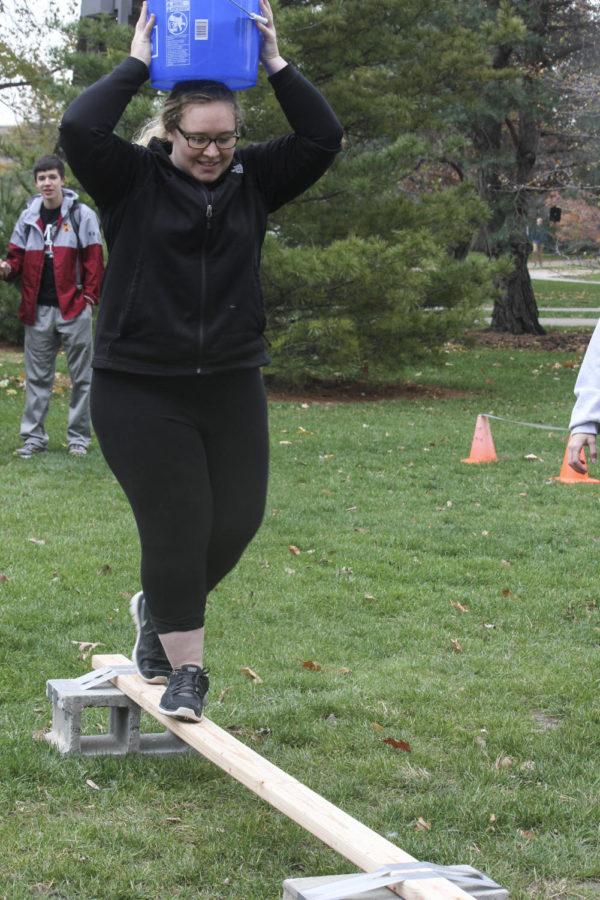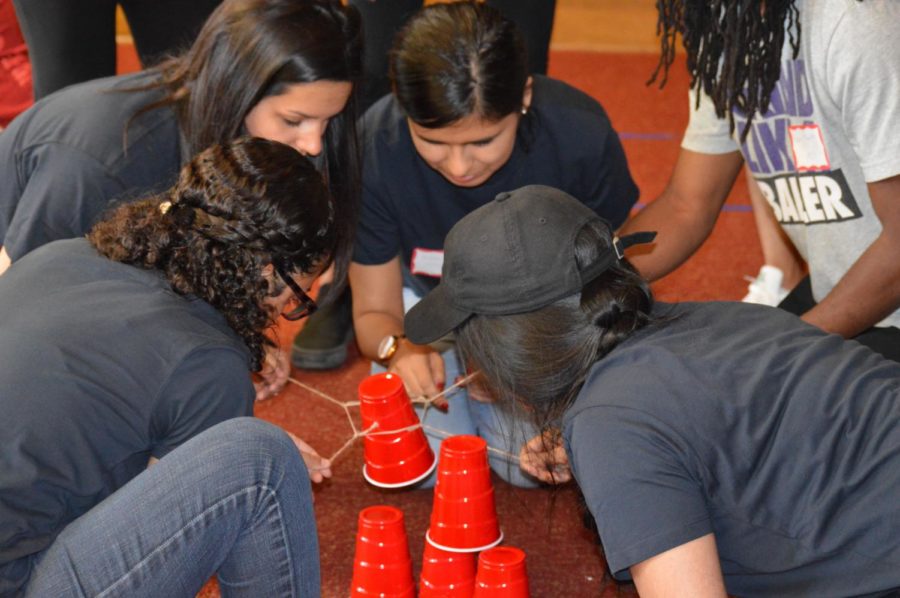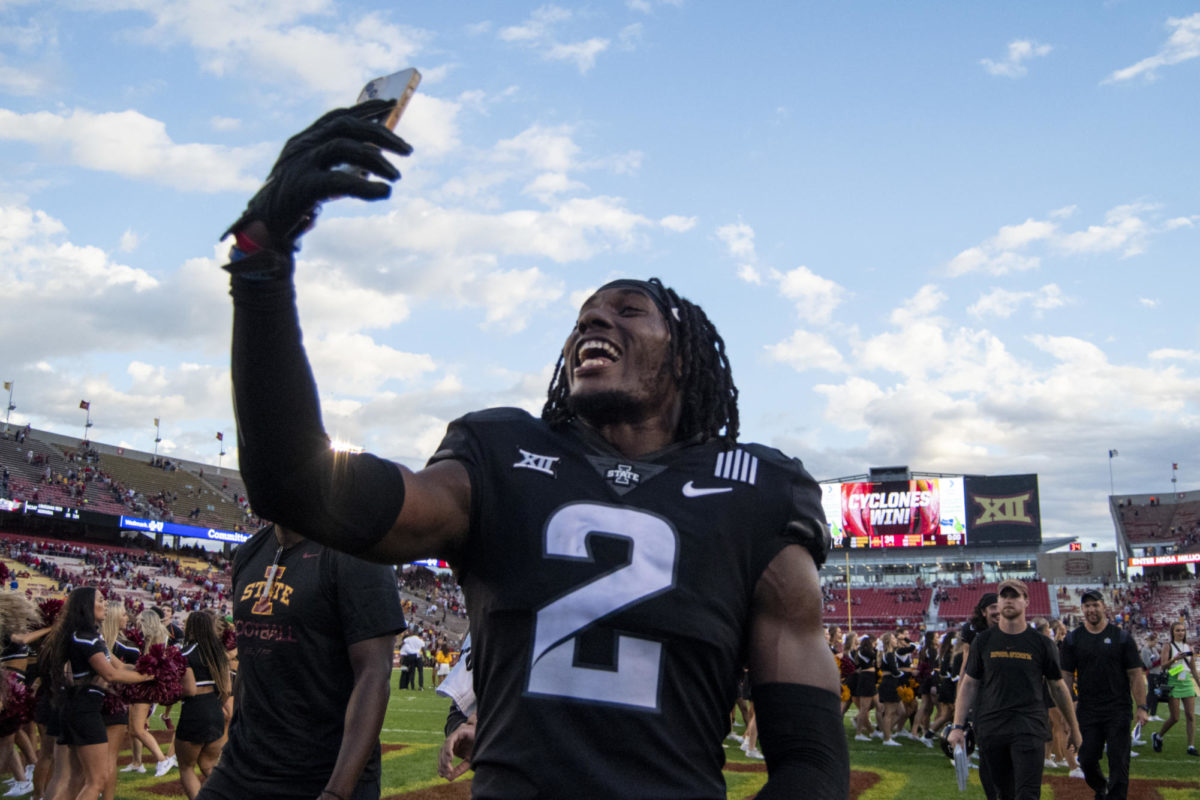Engineers Without Borders teaches about poverty, water scarcity
Allie Oberg, sophomore in elementary education, finishes the water-walk obstacle course outside of the library with a time of 1:19. Engineers Without Boundaries designed the course for Poverty Awareness Week to show the struggles of getting water for people in Ghana.
November 6, 2014
Five gallons.
That’s how much water some in impoverished areas receive after walking and carrying a five gallon bucket for miles.
Water is a daily element used to take showers, clean dishes, wash hands, use a restroom or quench a thirst.
Five gallons gets the average American a two and a half minute shower.
In some impoverished areas, five gallons of water sometimes has to provide a family with a day’s worth of cooking, bathing and drinking.
This week, Engineers Without Borders aims to educate the ISU and Ames community about the issue of poverty in and outside of America with Poverty Awareness Week.
The week kicked off Monday outside Parks Library with a water walk organized by Engineers Without Borders member Ha Lim Jeong, sophomore in mechanical engineering. Participants pumped water into a five gallon bucket and carried the water-filled bucket on top of their heads through an obstacle course to simulate the struggles of getting water in parts of Africa.
“We don’t really have a grasp of what people live like,” said Kelsey Brandt, junior in chemical engineering and member of Engineers Without Borders. “People don’t seem to want to point it out.”
Brandt said some people in Africa walk miles several times a day in order to get water.
Jeong, who mentors freshman in the Engineers Without Borders program, created the water walk so students could see and experience the struggle to get water in other countries.
“A lot of Americans aren’t aware of [poverty],” Jeong said.
The average person needs at least 13 gallons of water every day for cooking and personal hygiene, according to the Water for Africa Institute. The average American family uses 300 to 400 gallons of water each day.
Of the more than 800 million people living in Africa, about 300 million live in a water-scarce environment, according to the Economic Commission for Africa.
Poverty Awareness Week has been created to draw attention to poverty not only in underdeveloped countries but within the United States as well.
In 2012, the National Center for Law and Economic Justice said 46.5 million people were living in poverty in the United States, which is the largest number in the 54 years the Census has measured poverty. About 12.2 percent of Iowans live below the poverty line compared to 14.9 percent of all of the country, according to the latest Census data.
Engineers Without Borders is hosting several events throughout the week such as a poverty awareness fair, dodgeball tournament and a 5K run.
“I want it to be a good week,” Brandt said. “I want to see it grow every year.”
The poverty awareness fair will be held 5 p.m. on Thursday, Nov. 6, at the Multicultural Center of the Memorial Union and will showcase global statistics on poverty.
The poverty awareness fair will offer interactive activities such as a density square where students will be given a glimpse of the living conditions in other countries. Attendees will also be given the opportunity to throw a pie in the face of an Engineers Without Borders member for a $1 donation to an on-campus student organization called Students Helping Our Peers.
Students Helping Our Peers is an on campus food bank that students can utilize anonymously to get nonperishable food items and personal hygiene products.
Daniel Blom, sophomore in mechanical engineering and a member of Engineers Without Borders, said he is participating in order to use his major to make a difference in the lives of others.
“A lot of people haven’t discovered how easy and practical it is to make a difference,” Blom said.
While the poverty fair is being held, Engineers Without Borders will be promoting the dodgeball tournament that will be held from 6 p.m. to 9 p.m. Nov. 7 on courts eight and eleven at Lied Recreation Athletic Center. The tournament is another way for Engineers Without Borders to raise money and/or donations for Students Helping Our Peers.
Students are encouraged to create a team comprised of six to eight people and need to register in advance in order to participate; Engineers Without Borders will then compile a bracket. Each team member will need to bring a nonperishable food item or $1 that will be donated to Students Helping Our Peers to participate. The winners of the dodgeball tournament will receive a t-shirt.
To conclude their efforts of bringing poverty awareness to the community, Engineers Without Borders will be hosting a 5K Nov. 8, at Ada Hayden Heritage Park. Participants are encouraged to sign up at the poverty fair for a fee of $12. Participants are able to register the day of, however, prices will increase to $15.
Check in for the race will be from 10 a.m. to 10:45 a.m., and the race will begin at 11 a.m. Brandt said they have a beautiful course planned. The top male and female runners will each receive a $25 gift card to Target.
Brandt said the goal of the week is to make people realize that there is poverty not only in underdeveloped countries but where they live as well.
“We would definitely love to improve each year getting more and more people involved,” Brandt said. “It’s a great cause raising awareness of poverty. It’s something people are excited about.”

















